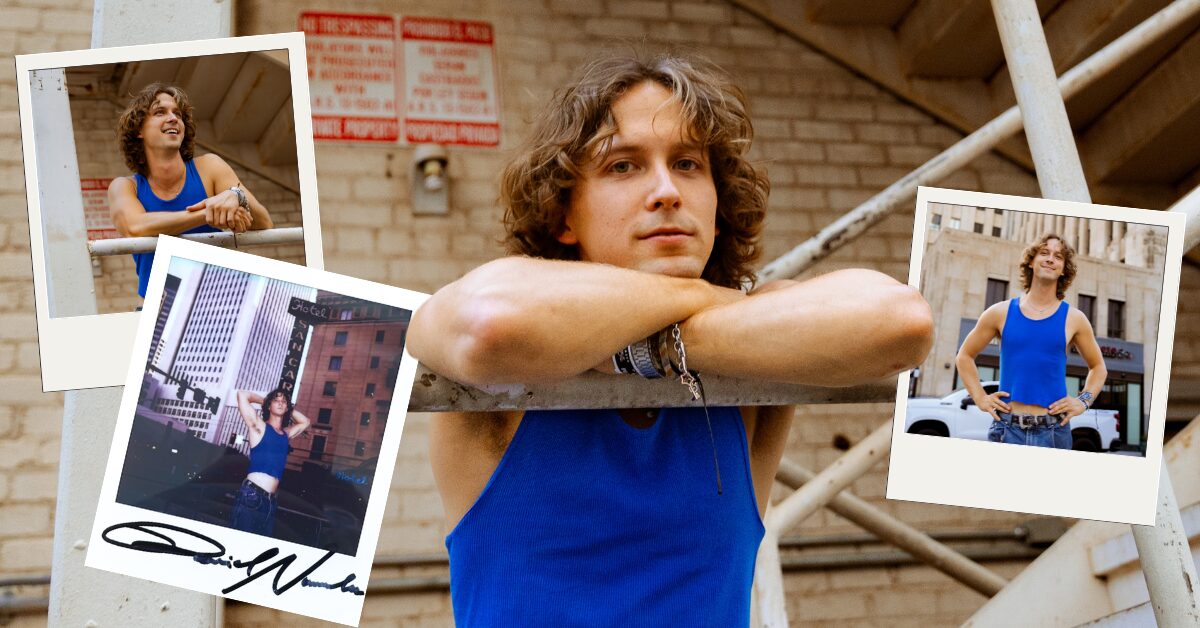
Oftentimes, when going into an interview, I prepare light-hearted questions. Asking about the new album, how the tour is going, who their inspirations are – finding ways to reinvent same ole questions like that but keep the conversation easy.
Somewhere in talking with Daniel Nunnelee that courtesy went out the window.
We sat outside a bar in Phoenix – Cornish Pasty – under the poor shade of a tiny umbrella and outdoor misters on overdrive. The city bustled behind him, but our corner was empty, simply us and photographer Brian Mecinas. At first, off-the-record, we started easy. Tour was okay, Nunnelee had been to Phoenix before playing with Annie DiRusso, Mecinas and I met through concert photography – simple stuff.
Once we were on the record, I asked about the inspiration for the album. This small question somehow started a 30 minute snowball into a vulnerable conversation about the power of music, how to navigate pain, and whether or not Daniel Nunnelee was proud of himself.
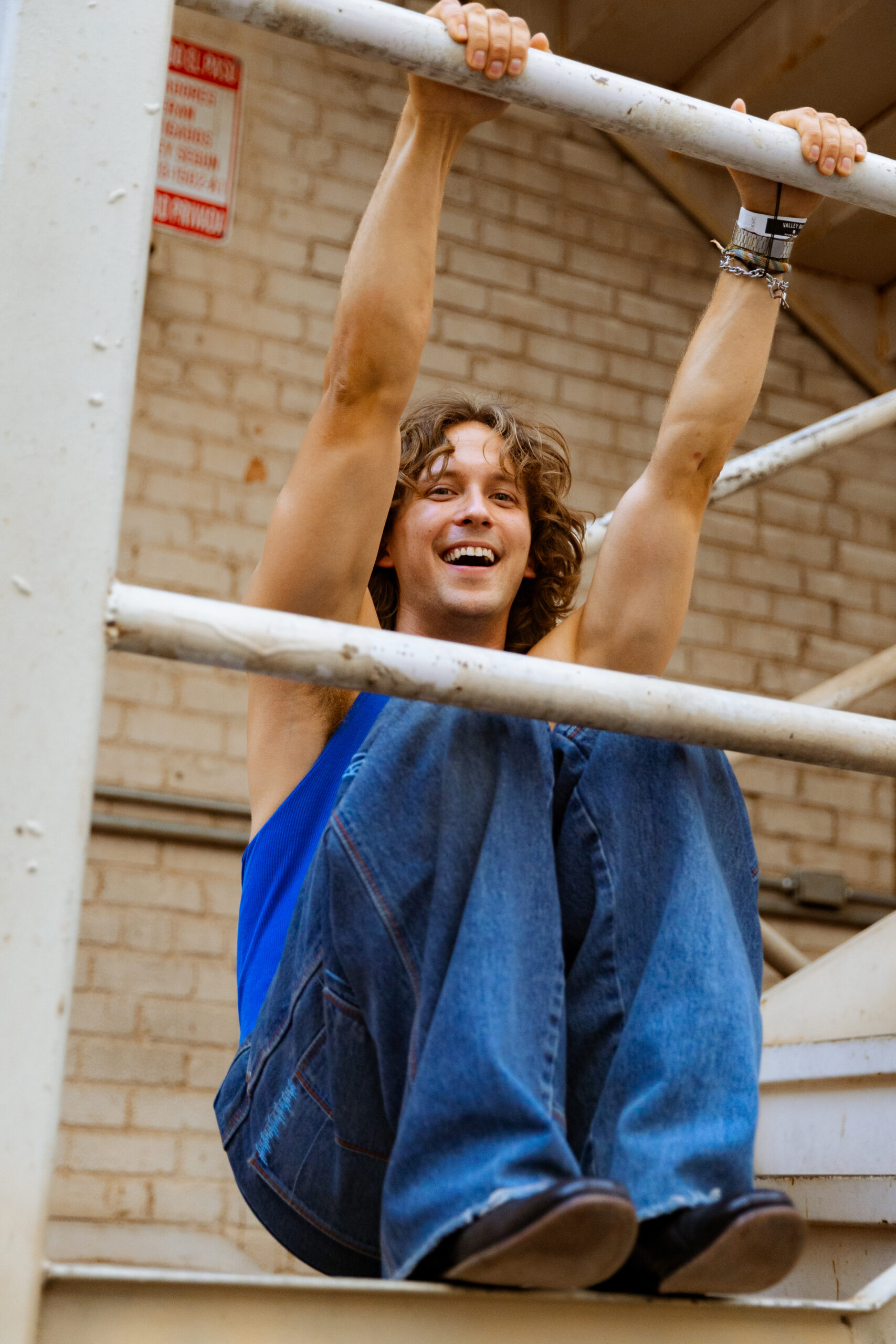
Nunnelee was born in Memphis and grew up in small towns in Mississippi and Tennessee. Unsuprisingly, this upbringing enstilled a deep love for nature in him, a theme heard throughout his album and music. “I grew up running around in the woods with my brother and playing around,” he explained. “So I definitely grew up with that kind of vibe. And now, I just love it and I’m always inspired when I’m in it.”
Much of his latest debut album June, Baby was written outside and in a cabin in Boulder, CO and a family cabin in Mississippi. “It was fun,” he explained simply. “It just, kind of, helps me. The combination of the beauty of it all and then the isolation of removing myself from the situation, processing things and not having the influence of everyone else’s thoughts. I usually turn off my phone when I’m out there too and just remove myself completely.”
{songwriting} is a really easy way to process and get something good out of something bad happening, and actually gain from it.
-Nunnelee
While most artists write from personal experiences, everyone has a different creative process. Sometimes, artists can’t write about an emotional experience until they feel they’ve completely processed it. Other times, artists like Nunnelee use writing as their way to process the experience.
During the writing of June, Baby, Nunnelee found comfort in the surrounding nature, as well as songwriting. “I was just trying to process a lot of stuff that I was going through,” he told me. There was a casualness to his tone, one I wouldn’t pry just yet. I simply let him speak. “That was an immediate ‘I need to figure this out and process this on my own think about this.’ So that was a direct in the midst kind of thing and helped me move through it in a healthy way.”
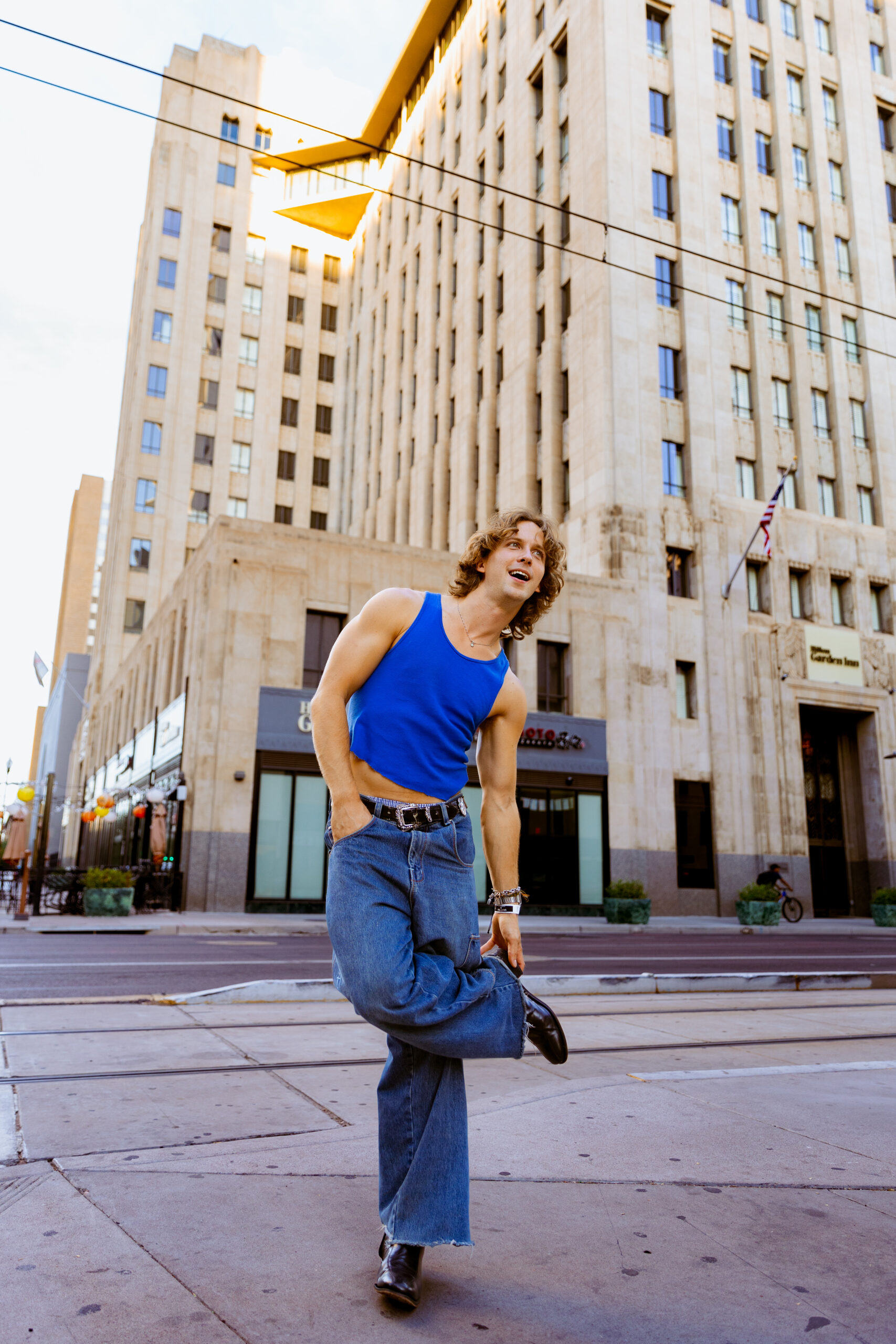
That sort of vulnerability is arguably necessary to, not only be a creative or specifically a songwriter, but to share your art with the world. “I think the thing about all of it is just… I’m only talking to one person.” Instead of writing for the sake of writing, he uses his songs as a way to communicate. For him, this allows him to feel more comfortable in the vulnerability. “It’s not just, ‘Oh, this is a cool concept.’ I’m specifically talking to somebody right now and trying to convey something to them. A lot of times it’s something that I want to say to someone . . . It helps me process what I even want to say when I’m writing stuff. So it’s journaling.”
As he answers he looks around at those that walk by, the towering buildings, the basically empty water bottle in his hands, but his eyes always come back to mine. He answers casually, but honestly.
Something that seems immediately obvious when speaking with Nunnelee is his soul. There is an air that surrounds him, one that seeps into his music but doesn’t compare to the real life person sat in front of me. Maybe it’s from growing up in small towns, or maybe he’s built it up over the years, but he seems to genuinely care about what I was asking, and how he was answering. However, I’d come to learn that I was talking with Daniel Nunnelee as an artist, and he’s ten times better as a person.

Despite him having such a bubbly personality as he spoke, life on the road isn’t an easy feat. Being away from the place you call home, not getting much comfortable sleep, hauling equipment everywhere, random people asking you intimate questions about your art, it wears down a person. When I asked what keeps him going on tour, his answer was so genuine and so beautiful in its simplicity.
“I think that people being extremely encouraging and excited at the shows is definitely a huge factor. The people attending are a huge thing. And just knowing that the people that I love back home are supporting me and excited. That’s pretty huge too. And then just…” He looked off into the street behind me, and his voice softened as he spoke. “I love this so much, you know? If I didn’t love playing music, it would be the worst job ever. if I didn’t love this, it would be impossible. But I just love playing music so it’s all just worth it. So as long as it can keep me alive, I’m just gonna keep doing it.”
We rambled about a few of the other jobs he had before he was doing music full time and landed on his time as a worship leader, something I was eager to talk about. “I grew up in the church,” I told him. “Worship was the first time that I felt the power of music. I think no matter what you believe in, there is that sort of power behind a lot of music… ya know?” I stopped once I realized I was rambling but Nunnelee looked at me, unwavering and supportive. I collected my thoughts internally and finally asked my question: “How do you think {worship music} inspired you then and how do you think it inspires you now?”
“I think there’s just a lot of power in bringing people together to sing together and all for the same reason,” he answered, almost immediately. “I’ve been to concerts that have felt the same as a worship thing, you know? And you can cry and do all this stuff and it’s, like,” he paused, seemingly coming to a realization. “Maybe I was actually just emotional over the fact that we all just felt united. It just felt we were all on the same page.”
“To me, it’s important to try to get out of the way and make sure that I’m not trying to make it too much about me and more about people that are attending, and their experience, and everyone just having realizations about their lives or just having beautiful moments, you know? People just want to have a beautiful moment and that’s why people are attending church. They want to connect with the higher power. I think it’s all possible at shows and with any music.”
During our photoshoot, we’d later go on to discuss how Mecinas and I felt that at a Chappell Roan concert, while Nunnelee felt it at a 1975 concert.
“I think that would make Matty Healy God,” I joked.
“Don’t tell him that,” Nunnelee responded, smiling at he posed.
“I think he already feels that way,” I admitted and Nunnelee nodded and laughed in agreement.
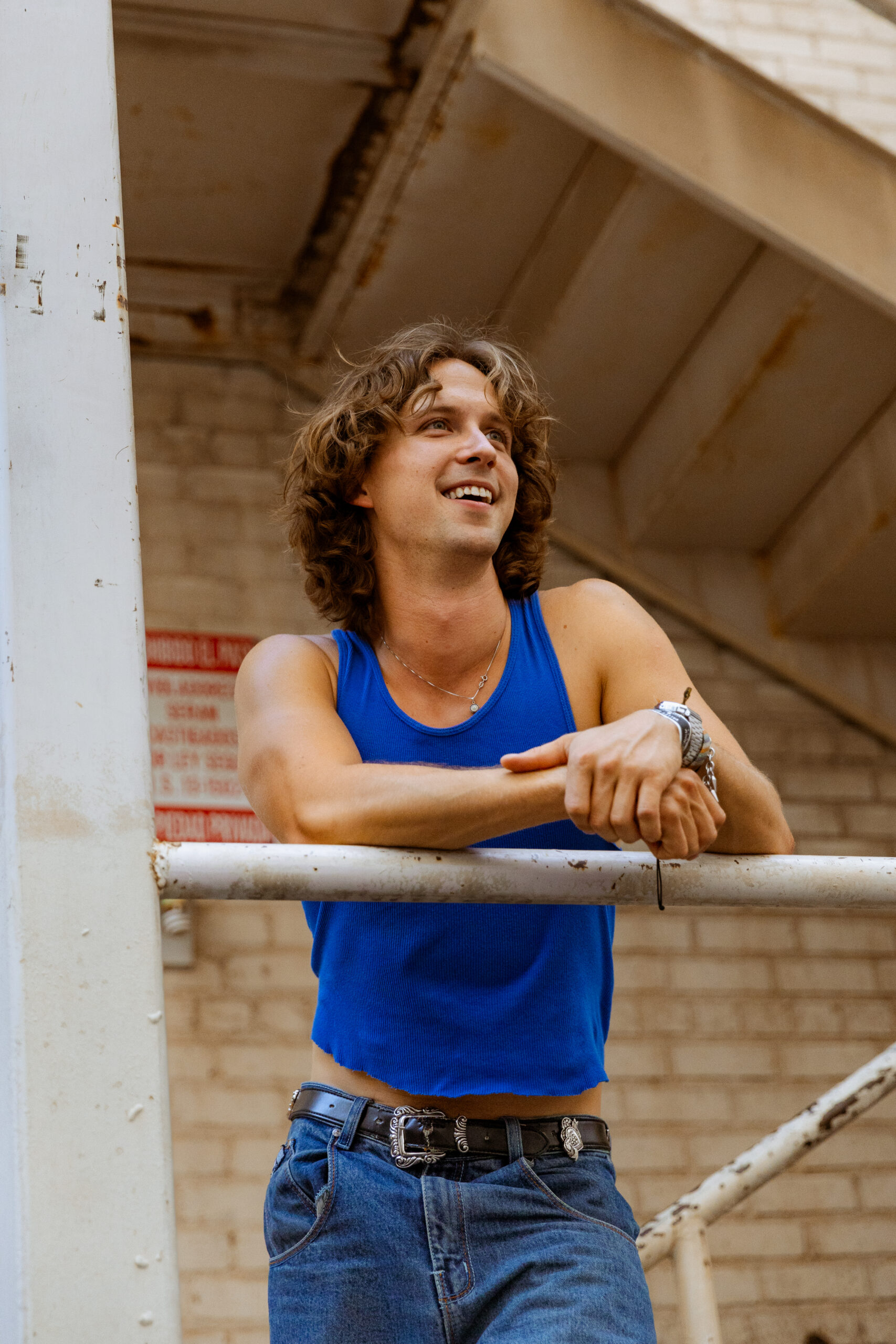
What I'm trying to accomplish now is deciding to do something and saying 'I'm going to do this. I think I am good at this' - believing that and not seeking permission to do what I love to do with music.
-Nunnelee
In September of 2017, Nunnelee released ‘Put Me in the Ground’, a haunting, folk-leaning ballad, featuring fellow Tennessee songwriter Austin Sawyer. The song currently sits at over 11 million streams.
Since that release, Nunnelee has released numerous singles, including his viral hit ‘Oak Trees’, and two stunning EP’s. To his fans, an album has been long overdue. But Nunnelee wasn’t in a rush. While he has a lot of music out, his debut album needed to be curated, not just released for the sake of having music to put out.
“It’s all written in the same year of my life, and it was always very cohesive and about the same thing,” he explained, with a bit of rambling. However, as he finally found the words he wanted to say, his answer felt much more confident. “I’ve written songs since recording that album and I’m just like, this is just a different story. This is a different part of my life that I’m talking about now. It was almost just a documentation of my year and the way I was feeling.”
As you listen to the album, you feel the ups and downs of living life and processing emotions. Majority of the album is softer ballads like ‘Deer Trails’, ‘Edge of Eternity’, ‘Why Don’t You Just Come Over?’, mixed with hard hitting outbursts of emotions in ‘I Wanna Die Before You Die’ and ‘Kick Down That Door’. It takes you on a ride, looking into Nunnelee’s journey of processing emotions. And it all comes together, ending on ‘Are You Proud of Me?’.
The song struck me deeply on my first listen of the album and had stayed with me ever since. It is heartbreaking and vulnerable and moving. When I asked Nunnelee about it, his answer was just as vulnerable and moving.
“That was one of the songs- well that was the song that I wrote in that cabin in Mississippi,” he began. He told me a story of his dad, rambling for a second and telling me “I don’t want to get into this too much because I don’t want him to read this and get sad.” However, he continued, paraphrasing the story a bit to get more into the explanation of the song.
An opportunity fell through, something Nunnelee was really excited for. “When I told my mom, she was ‘Oh I’m so sorry that happened to you,’ but with my dad it was like oh man… it felt he had lost something. I was just like, ‘Are you proud of me just because I’m accomplishing what you see as success or are you proud of me just because I’m your son?'”
Experiencing pain and being miserable is just a different choice that you can take.
Nunnelee
It’s a story a lot of young people experience. Many follow life paths and make choices simply because they feel it will make their parents happy or proud. And oftentimes, parents disappointment feels worse than their own. For Nunnelee, it hit him hard. It was obvious how much making his family proud meant to him, and feeling like he had let them down wasn’t easy to deal with. “I just drove to the ocean immediately- which is far from Nashville. It’s like nine hours,” he recalled. He was able to look back on the memory with hindsight, and recounted the story with a small glimmer in his eyes and a relatively casual tone.
“I drove all the way down there the next morning and just stood in the ocean for a while. I just kind of ask God, or whoever, ‘If you’re going to make this happen, give me a song or something. Let me have something from this experience.’ And then I went.” He drove to his family’s cabin in Mississippi, and ‘Are You Proud of Me?’ was born. “That just kind of spilled out.”
“What I’m trying to convey in that song is that the first verse is talking to my dad. The second verse is talking to God. And then the third verse is talking to myself . . . Which is something that I think is important to ask yourself: Are you proud of yourself even if you don’t accomplish everything that you hope to?”
He continued on a bit and I will be honest, if I wasn’t recording I wouldn’t have remembered a word he said. The question hung in the air as he spoke and he either knew the power and wanted to avoid it, or had simply already asked himself too many times. But it was profound. And I needed more.

“I feel that’s really what songs are for me,” he explained. Casual seemed to be his default tone, never giving too much weight to whatever he said, no matter how vulnerable the statement. He was letting me see into, essentially, his soul and pick apart his brain and yet, he never seemed to shy away from a question. Or, maybe my questions were boring, who knows? But Nunnelee entertained them anyways.
“{Songwriting} is a really easy way to process and get something good out of something bad happening, and actually gain from it. Because it’s hard to it’s hard to see things. It’s hard to think that you gained something from an experience if you don’t have something to prove that. Even if you know it’s a loss.”
As a poet, I knew exactly what he meant. And many other writers can probably relate, as well. When hard things happen, especially for no reason, we need a way for it to make sense. Nobody truly believes that life won’t get hard. But that doesn’t mean we’re okay with it when it does. And sometimes, you get incredible pieces of art from it. And maybe that makes it worth it.
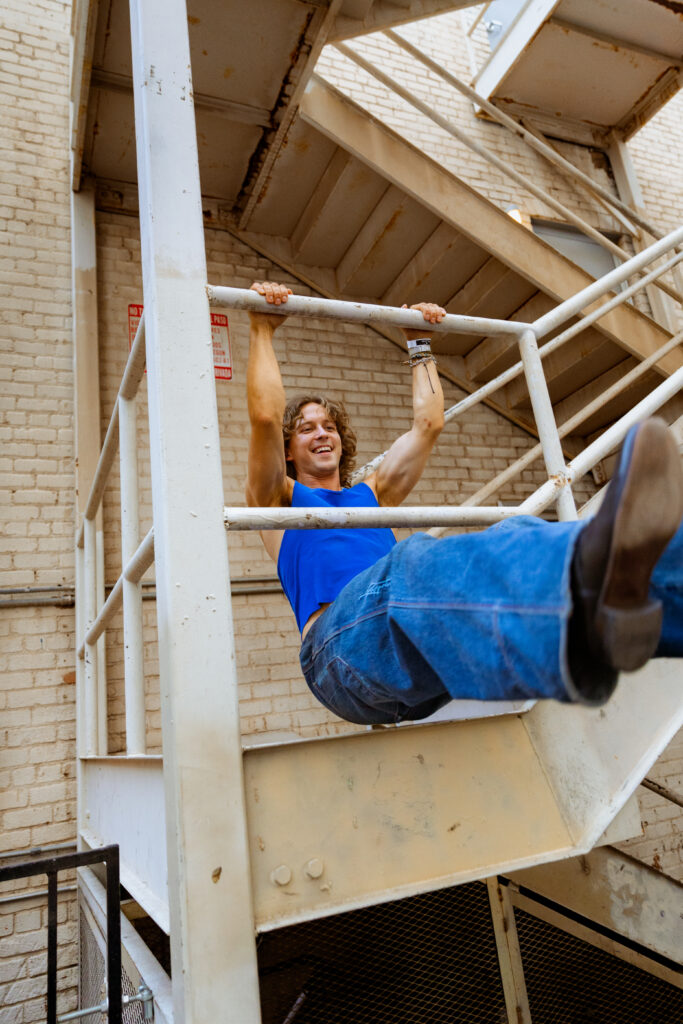
“Well then I guess the big question is: Are you proud of yourself?”
He laughed, knowing it was coming. “I think so, yeah,” he answered quickly, though his voice sounded unsure. “I’m trying to be, you know?” he finally admitted. As he spoke, he fidgeted with the empty water bottle in his hand but when he looked at me, he was smiling. Wheels were turning in his head, the wall he pretended to not have was actively falling, his eyes were different. I stayed quiet, silently urging him to say more. And he did. For the next three minutes I sat quiet and Nunnelee went off on a sort of stream-of-consciousness monologue about how hard it is to be proud of yourself, and how he’s working on it every day.
“It’s easy to give power to the gratification of numbers and stuff,” he continued. “Whenever that’s not 10 out of 10, going crazy, it can kind of make you question a lot about yourself and your ability. It’s kind of hard to answer that confidently, you know? But I would like to say yeah. And I just try to understand that the validation comes from within. And I can’t… I don’t know, it’s easy to look to other people and be like, ‘Am I doing good? Am I good at this?'”
“I started doing music in the first place because people were telling me that I was good at it. I started playing guitar when I was 10. But then, when I was 13 or 14, I started teaching a couple of my friends how to play, just so I had some friends to jam with in my tiny town that I was living in where nobody played,” he chuckled lightly. “I would sing a little bit to teach them a song. Then they’d say ‘You can really sing.’ And then I’d say ‘Oh really?’ And they’d say ‘Yeah, you should sing for so-and-so. And then I’d sing for so-and-so and they’d say ‘Wow, I really like that. You sound great!’ And it just was built over time – people just affirming me and being like ‘You’re really good at this!’ And it’s almost been… I’ve been looking to people to get that affirmation. It’s almost like I’m seeking permission from people.”
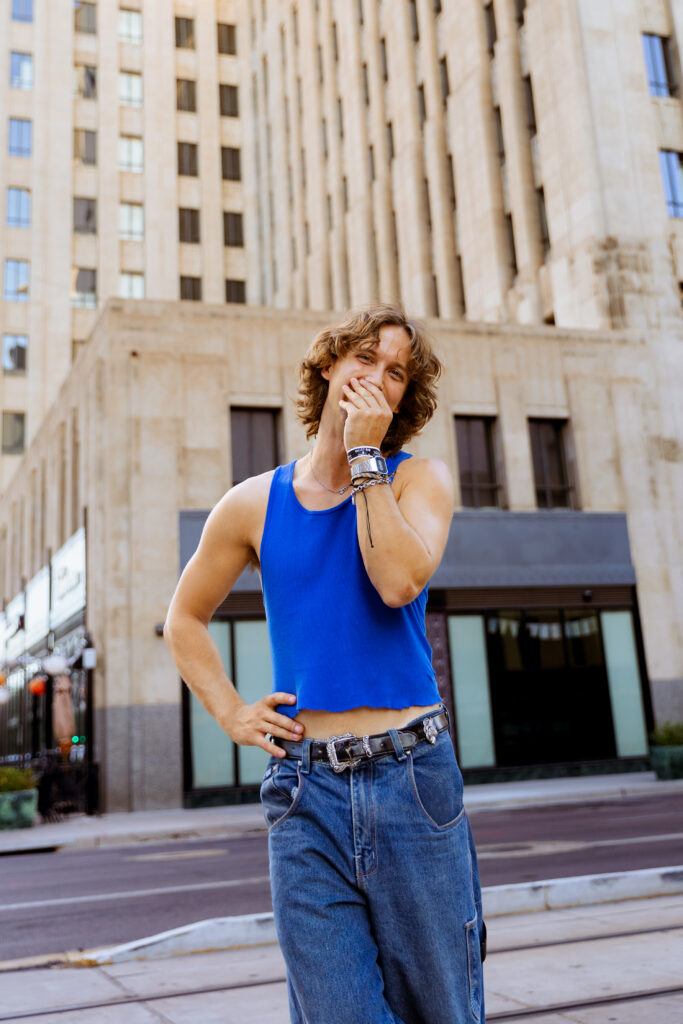
“What I’m trying to accomplish now,” he continued. “Is deciding to do something and saying ‘I’m going to do this. I think I am good at this,’ – believing that and not seeking permission to do what I love to do with music. Which, it’s hard to adjust that. That is kind of the law of the foundation.”
“Growing up, I never really had to deal with people saying ‘You’re never going to do this!’ I grew up in a small town where everyone’s just like ‘That’s awesome man! You should do that,’ you know? So, it’s trying to accomplish another level of success beyond that which is a lot more difficult because you really do have to believe in yourself and really believe that you are able and capable. After you do eight hours of rehearsals you just sit at home and you’re like ‘I have to really believe that this is good. I’m putting a lot of time into this.'”
“But to answer that as long as possible and now as short as possible: I think so.”
As he finished, he seemed a bit embarrassed at his rambling, but I had hoped the look in my eyes put him at ease. His answer was raw and real. At times it was unsure, and other times it was so sure that it bordered excited. It was the moment where I think me and Nunnelee connected in a deeper way than we had the entire interview. It may be self-righteous of me to believe that Nunnelee looked at me differently after answering, but I sure looked at him differently. He was real now, not just an artist I was interviewing, but a person who jumped into a spotlight and was learning how to deal with it.
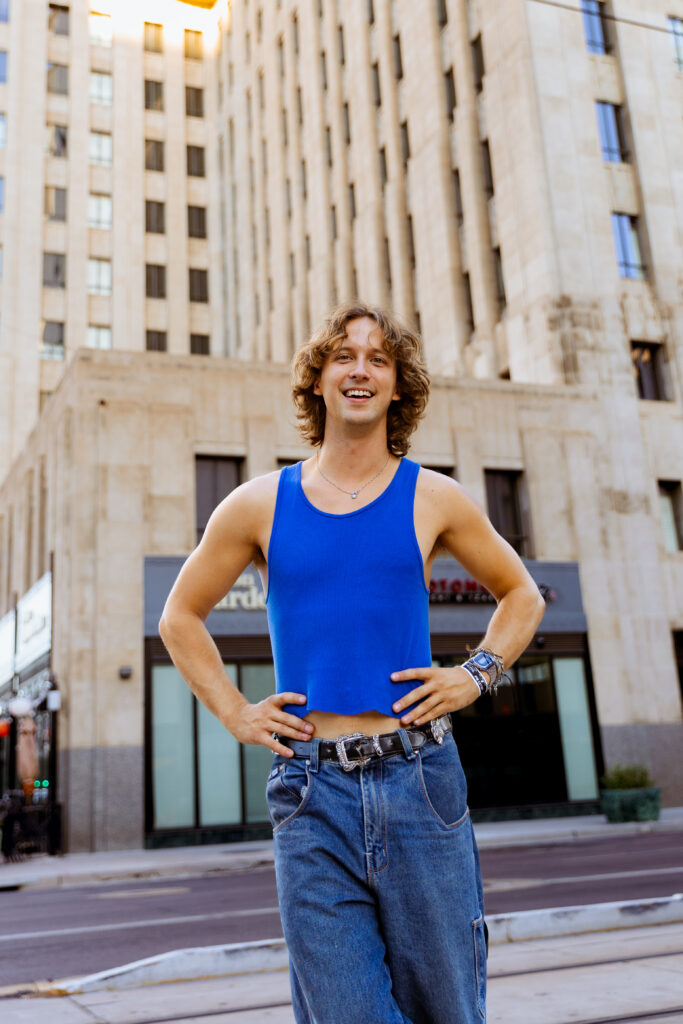
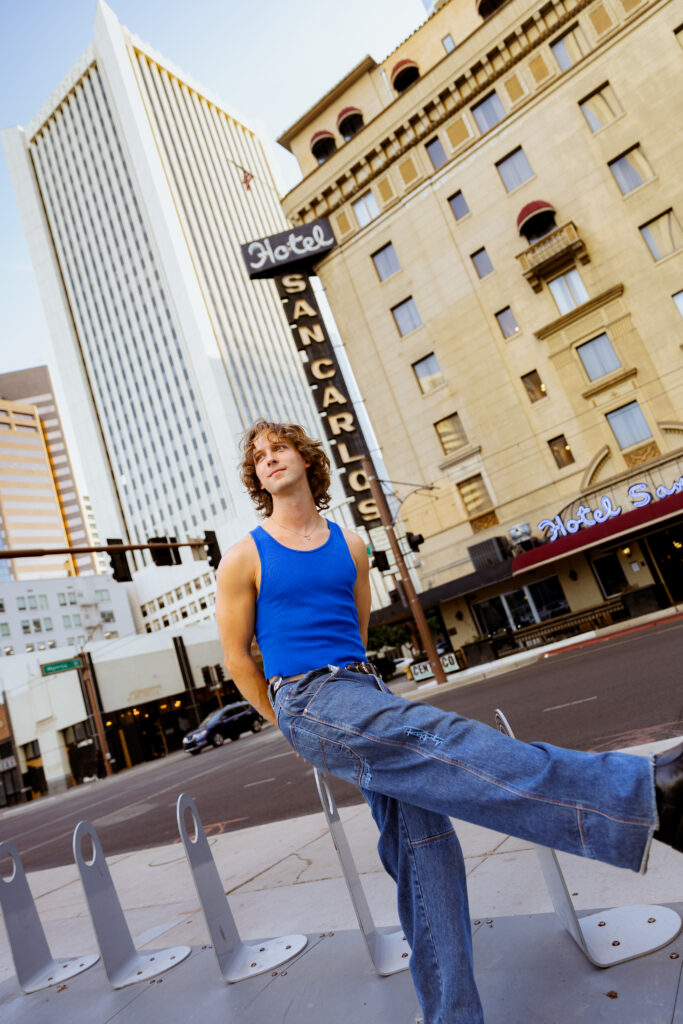
In any and every artistic career, from the outside it’s easy to gauge success by a monetary value or by streaming numbers and charts. But from the inside, every artists knows that metric does not come easy and isn’t entirely based on your art at all a lot of the time. Something else has to keep you going. Your love for what you’re doing has to be enough.
“I think that true success is just genuinely being happy and being present,” Nunnelee said. As he reflected on his journey, he explained how different it can feel being artist now than before he had a team and really had to worry about the numbers and the money. “Sometimes it can feel I’m working an office job,” he admitted honestly. He talked about the tough side of the music industry: the business side. Having to answer emails, and make content (like interviews) can sometimes take you out of the love of making music. “But it’s all in the spirit of getting to do what I want.”
“I think that, really, success in life is just being present and enjoying your life and enjoying the hard stuff, too. And when I’m at my healthiest, I really enjoy leaning into the feeling of being miserable-” he backtracked a bit after he said the word. “Not miserable. Because there’s a difference… I guess the feeling of pain. Because there’s a difference between pain and misery, you know? Pain is something that you’re going to experience in life but misery is something that… Being miserable in a situation is different than having pain. Because you can have pain and be present and move through it and learn to enjoy that sensation. It’s this is just a different sensation.”
“Experiencing pain and being miserable is just a different choice that you can take. But that’s success, you know? You can really enjoy everything, really live it. Breathe through it and be in it.”
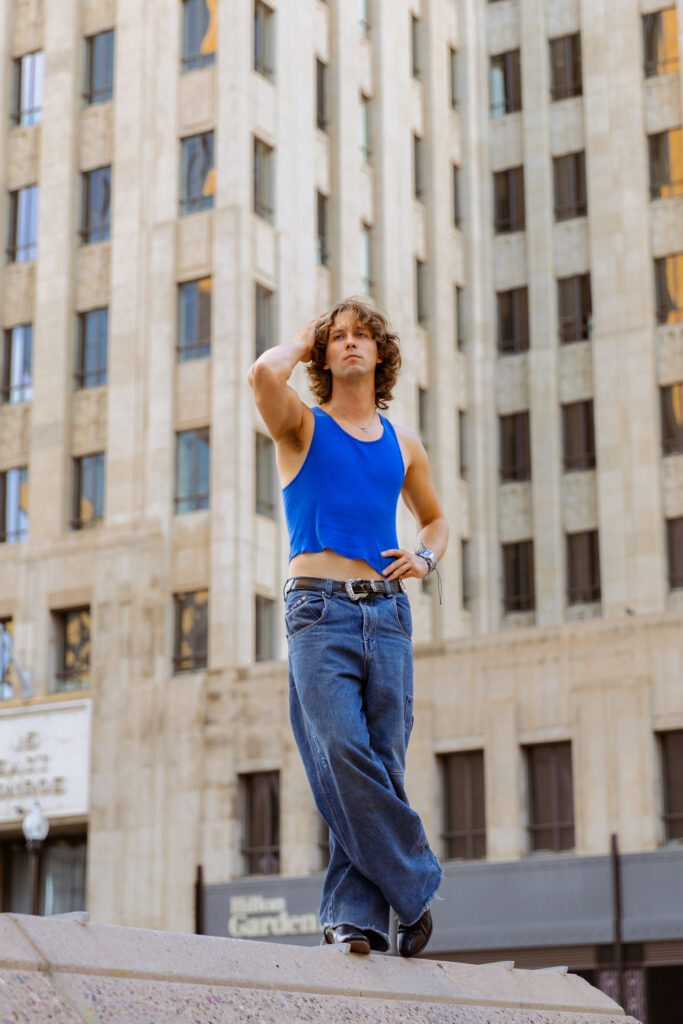
I stopped recording and smiled. By the end of the 30 minutes I spoke with him, I saw a new side of Nunnelee, and his art meant a lot more to me.
We all got up and started walking around downtown Phoenix, looking for good places to stop and grab some pictures. We jaywalked a bit and crossed the street, Nunnelee standing on the corner. There was a part of me that was nervous about taking pictures so publicly on a street corner, but Nunnelee didn’t shy. He posed naturally, and for the first time since we’d met 45 minutes ago, we spoke casually.
He told us about his tour crew grabbing Jack In the Box before the interview, which he was realizing was not a good choice. They normally eat pretty healthy on tour, but they had to stop for an oil change – which he then told me about learning ‘pretty privilege’ and not having to pay for the car work.
At one point, Mecinas joked about not being able to pose people and asked Nunnelee to ‘serve’, to which he started laughing harder than he had since we met. It became a running inside joke for us three.
I complimented his insanely cool belt, to which Mecinas jokingly asked who he was wearing. Nunnelee jokingly answered “I’m wearing Goodwill,” showing off his shoes. “I’m wearing yard sale,” he answered secondly, grabbing his belt to show it off. “And I’m wearing Walmart,” he said with a smile, grabbing the bottom of his tank top.
The entire photoshoot, his laugh would echo around us, his smile beaming. There was something so comfortable between all three of us and for a moment I forgot he was Daniel Nunnelee, a singer-songwriter with millions of Spotify streams and over 100 thousand Instagram followers. All he was now was Daniel, serving in his yard sale belt. Even now, I write this interview and can’t help but smile remembering all of the details. There are very few serious pictures because there were very few serious moments.
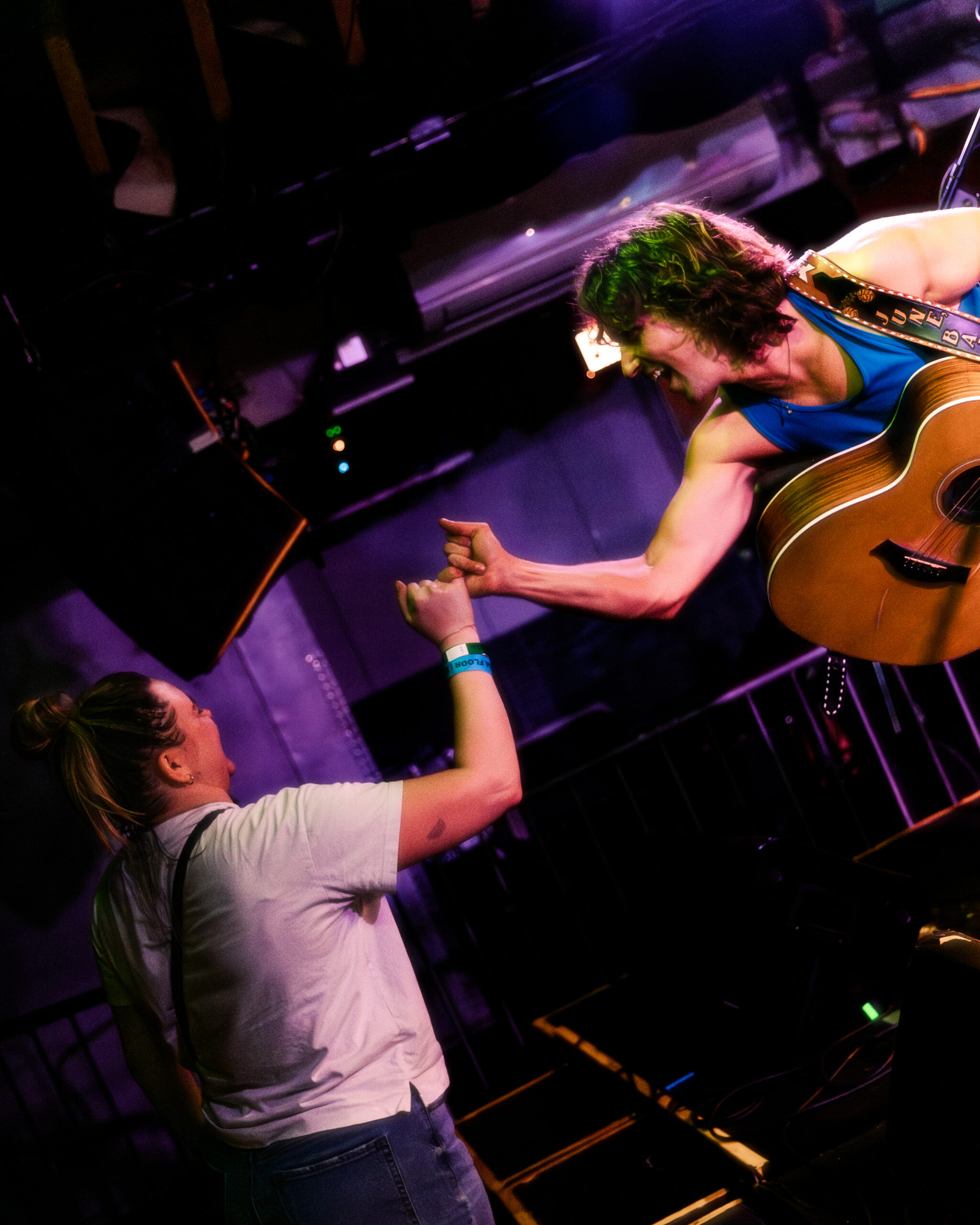
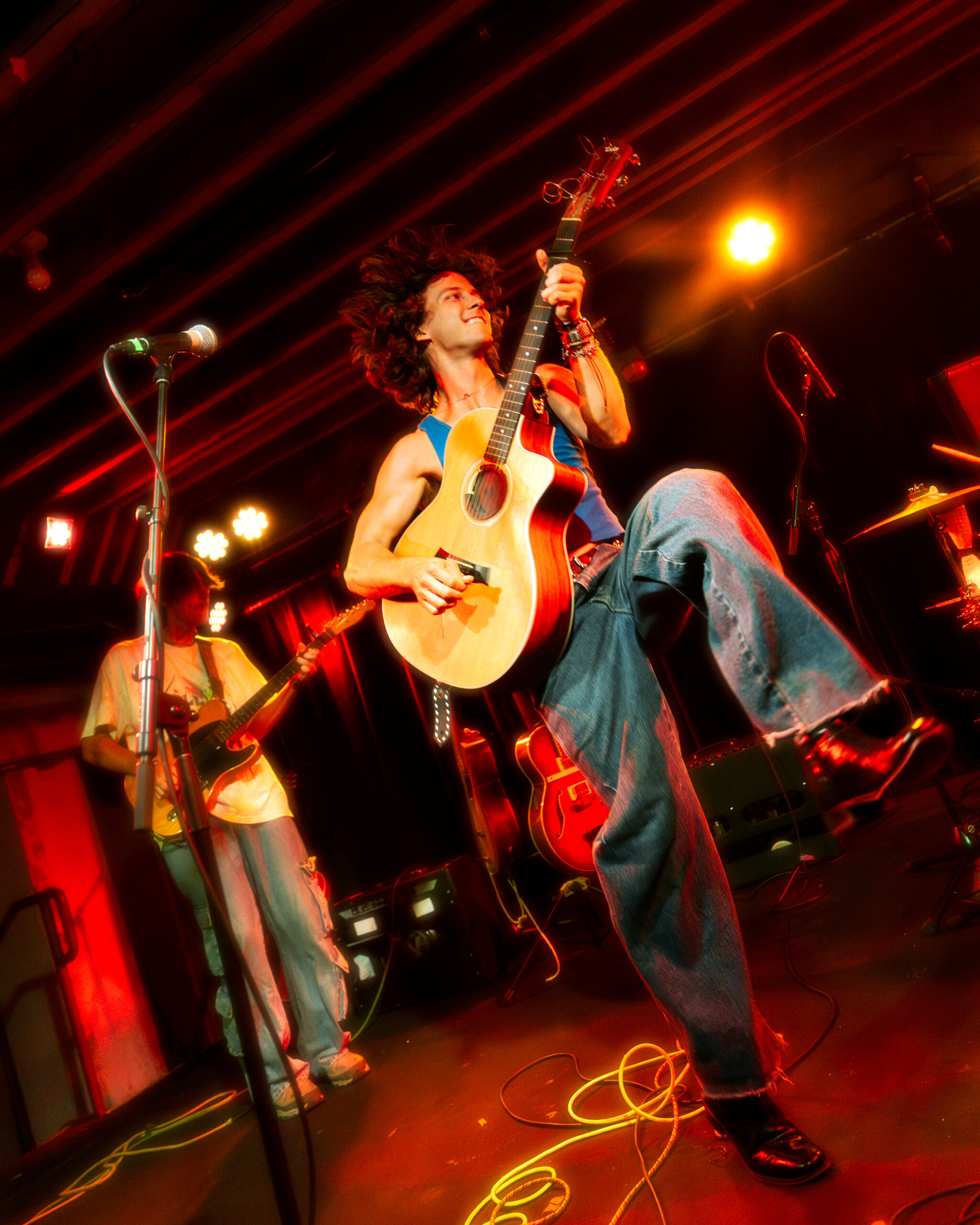

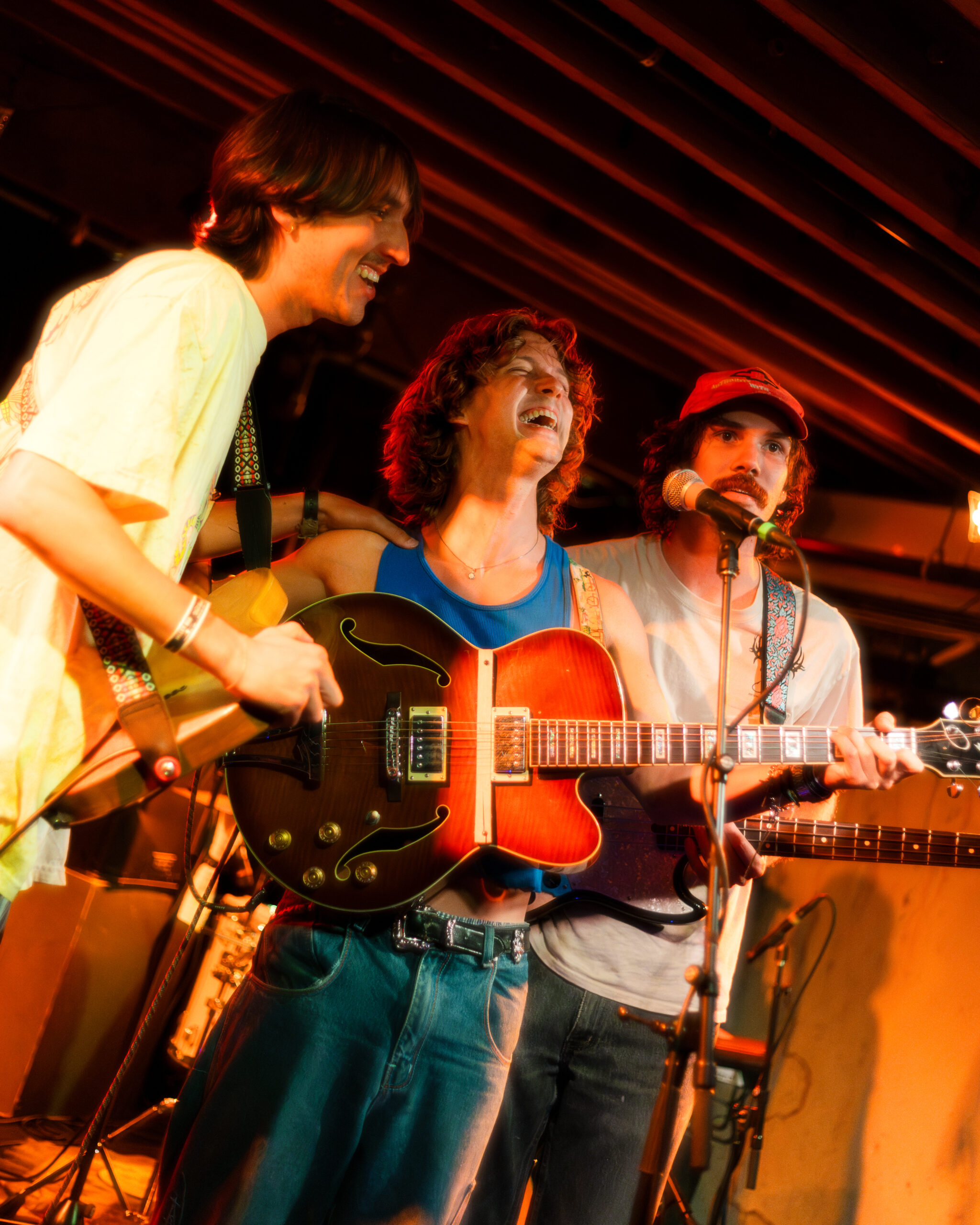
As he got on stage for the show, he looked out to the crowd with such a smile. The show was small, intimate, and absolutely beautiful. Nunnelee made the show so personal, at one point getting into the crowd to perform an acoustic version of ‘Oak Trees’ with the crowd.
He sings and plays with such an incredible passion and evident love for music. His performance was fun and moving and mesmerizing. While on stage, he is so captivating it’s hard to watch anything else. Everyone in the room felt more like a friend than a fan.
I knew a bit about Daniel Nunnelee before I met him for the interview, but I wasn’t sure what to expect. However, as we caught up with him after the show and joked around and chit-chatted, I realized I was leaving that show with a new friend, and a new love for his music. He is one of the most genuine, down-to-earth people I’ve ever met. His heart and soul are as beautiful as his voice, and anyone who crosses his path is very lucky.
On stage and off, he is full of joy and heart and no matter where he goes, he is going to change lives.




